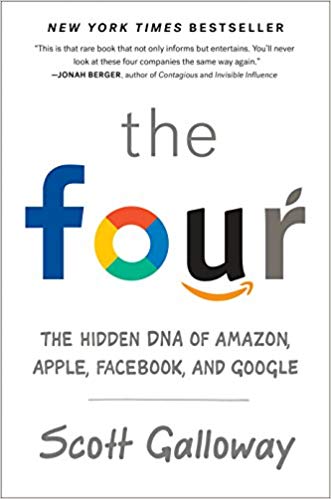The Four by Scott Galloway - Book Review
I read a lot of books but rarely find much to like within the business strategy segment. Typically they are high on fluff, poorly written, and repeat the same basic point over and over again. One exception is The Wide Lens by my favorite business school professor. The other, which I just read, is The Four by Scott Galloway, a professor of marketing at NYU and founder/co-founder of multiple firms.
The book makes an eloquent case for why the big four tech companies–Apple, Facebook, Google, Amazon–should be broken up. But it also explains why they are so successful and likely will be in the near future. It’s rare to read analysis that’s so sharp (and funny).
Galloway touches on more than just the Four Horsemen as he calls them. The book is full of advice around managing one’s career, which I suspect comes from his work with 20/30 somethings at NYU and professionally.
If you’d like a taste of his style, check out this amazing presentation he did recently on The Big Four.
Quotes
Here are a few choice lines from the book:
-
“Governments, laws, and smaller firms appear helpless to stop the mach, regardless of the Four’s impact on business, society, or the planet. However, there’s safety in hatred. Specifically, the Four hate each other. They are now competing directly, as their respective sectors are running out of easy prey.”
-
“Most consumers don’t want to be equal; they want to be special. And a sizeable fraction of the consuming population will pay a premium for that attention. That fraction also tends to be the customers with the most disposable income.”
-
“CEO pay has become so crazy that on a risk-adjusted basis, you’re better off staying out of traffic, logging your six to eight years, and retiring rich…History favors the bold. Compensation favors the meek. As a Fortune 500 CEO, you’re better off taking the path often traveled and staying the course.”
-
“Plot a heat map of mobile operating systems, and the geography of wealth illuminates.”
-
“Luxury brands…share five key attributes: an iconic founder, artisanship, vertical integration, global reach, and a premium price.”
-
“There are few better examples of what Pope Francis refers to as an unhealthy “idolatry of money” than our obsession with Steve Jobs. It is conventional wisdom that Steve Jobs put “a dent in the universe.” No, he didn’t. Steve Jobs, in my view, spat on the universe. People who get up every morning, get their kids dressed, get them to school, and have an irrational passion for their kids’ well-being, dent the universe. The world needs more homes with engaged parents, not a better fucking phone.”
-
“Rich people are more homogeneous than any cohort on earth…The global elite is a rainbow of the same damn color.”
-
“Every successful firm in the digital age needs to ask: In addition to big, tall walls, where can I build deep moats. That is, old-economy barriers that are expensive and take a long time to dredge (and for competitors to cross).”
-
“Harvard could foster the same disruption if they take their $37B endowment, cancel tuition, and quintuple the size of their class–they can afford to do this. However, they suffer from the same sickness all of us academics are inflicted with: the pursuit of prestige over social good. We at NYU brag how it’s become near impossible to gain admission to our school. This, in my view, is like a homeless shelter taking pride in how many people it turns away.”
-
“We now have a Benjamin Button class of products that age in reverse. Wearing your Nikes makes them less valuable. But posting to Facebook that you are wearing Nikes makes the network more valuable.”
-
“Newspapers can reach millions…but they gain almost no intelligence from this contact…TV stations know even less. And judging by this scheme, dumb companies correlate closely to losers. They were paid to be dumb, as data could have helped advertisers determine which 50 percent of their advertising was wasted and reduce spend.”
-
“Don’t kid yourself: Facebook’s sole mission is to make money. Once the company’s success is measured in clicks and dollars, why favor true stories over false ones? Just hire a few “media watchdog” firms to give you cover.”
-
“Stealing is a core competence of high-growth tech firms.”
-
“Great companies often rely on some sort of lie or IP theft to accrue value at a speed and scale previously unimaginable.”
-
“Bill Gates and Steve Ballmer were neither likeable nor cute. In fact, the room got brighter whenever they left it.”
